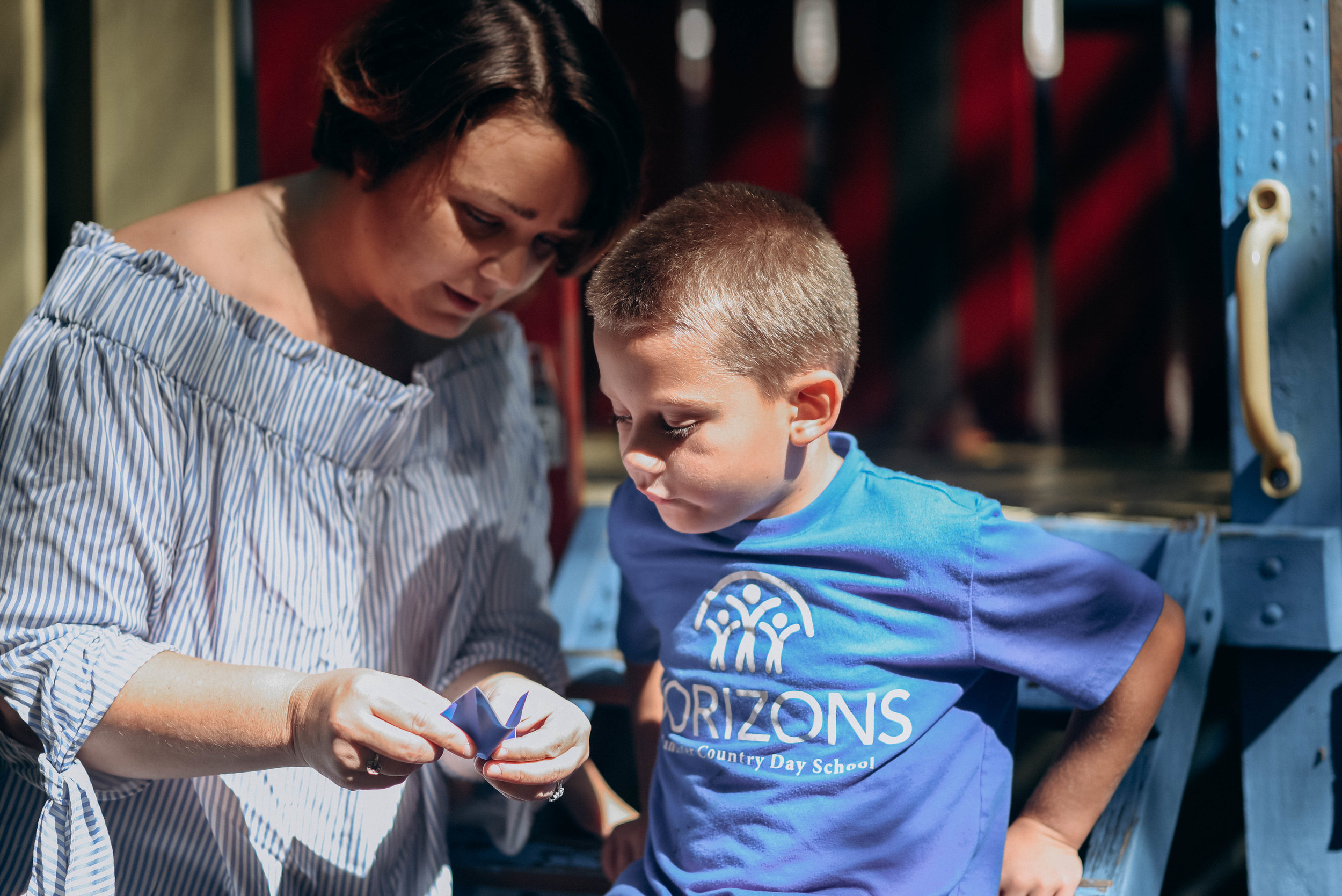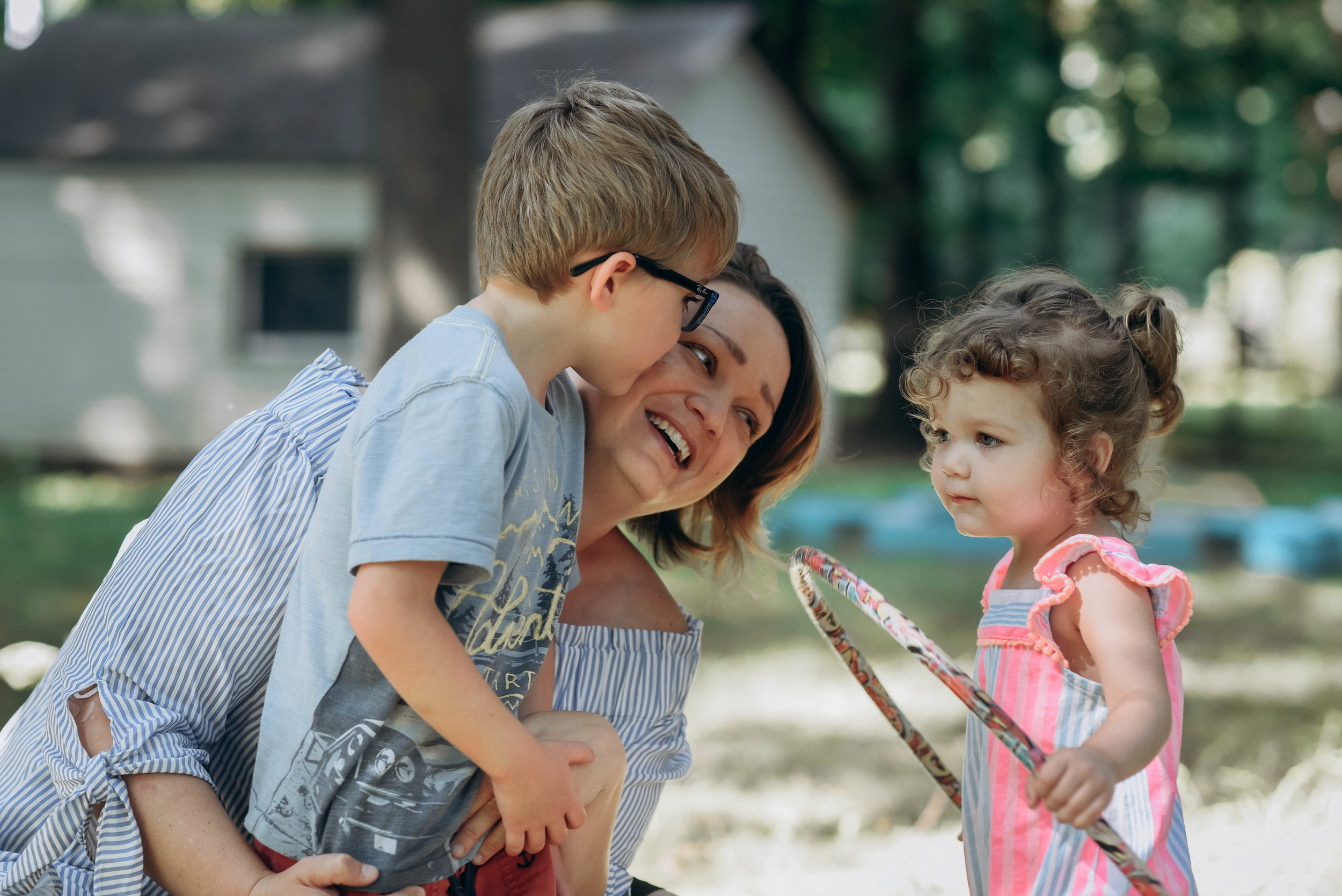Story #46 - Megan, Fairfax VA (USA)
I had uterine growth restriction with my first son. When we did the sonogram to confirm that his birth weight would be low, we also found out that the cord was wrapped around his neck several times. If he hadn’t been measuring small, we would have never known about it and it’s likely he wouldn’t have survived a vaginal birth. I ended up having an emergency C-section, and I was 100% behind that decision, but it was still a very surreal experience. There’s this real wall between you and your baby, and then they pass it over the curtain saying “This is your child!” But is it? He was born 5 pounds even. I just remember being in the breastfeeding circle in the hospital and looking around at the other babies thinking “Did they eat my child?!” They were literally twice the size of my little peanut. I went through postpartum depression with him. It was low level, but it wasn’t baby blues either – I hate that term. He was such an easy baby, which made it a bit better, but we were struggling with breastfeeding, and eventually, we had to go with all formula. It was difficult at first, but my husband and I are into equal partnership and parenting, so I felt like we were now sharing the whole feeding ritual and I didn’t mind that much. I also went on antidepressants and stayed on them during my second pregnancy, because I didn’t want any sort of drop off. When the time came to discuss my birth plan, there was heavy leaning on the dangers of a VBAC versus a repeated C-section, so we went for it. In the light of what happens next, it’s very upsetting that this old-school mentality makes you think you’re safe if you stay under 3 C-sections, without taking in consideration prior uterine surgeries – which I had. I loved my OB practice, but C-sections aren’t an easy way out for anyone, except maybe for the doctors.
My second son came out at 38 weeks. He was healthy and in the 80th percentile, but before we knew it, he was down to 0. He refused to eat. He had very painful silent reflux, and doctors were reluctant to medicate him. I guess they think parents automatically equal crying with reflux, but I knew something was wrong. I also knew that if it wasn’t addressed quickly, it would become a behavioral thing, and after several tests, they agreed to treat him. We first had to be trained to get an NG tube, and he had to be hospitalized. As a non-medical professional, it was the most terrifying thing to be responsible for placing this tube, because if it moves by an inch, he can drown. My husband didn’t sleep for three months, sitting by the baby's bed, whereas I was too emotionally depleted. In this story, my husband is the hero. Our son eventually had to have surgery to get the G tube. It felt awful but in the end, it was a blessing because it gave him time to heal from the reflux and when this was done - about a year and a half later - he happily ate. He also had low muscle tone and during his second surgery to remove the tube, they decided to do an MRI. At the end of the procedure, he had something called emergent delirium where he woke up too early. You’d think there is no such thing as PTSD for a 9 months old, but I promise you there is. He was not the same child after. For months, he was terrified of anyone but me. It was a really traumatic time. The MRI also showed some brain damage, a form of cerebral palsy called periventricular leukomalacia. I was devastated, but we were really lucky to be in the care of early intervention. We had a physical therapist that came to our house three times a week, through the county. Free intervention care. She was calm and reassuring, so I just had faith in that. We worked really hard to get him there because socially and developmentally, he was behind. He also went through special education for a year and a half in a classroom full of magic makers. He came out a different kid. When they kicked us out of special ed., I was like “No! I love you guys so much!”
We really believed that we would never have a third child because it had been such a journey with our second, but I joke that my husband and I had a very optimistic week, and that’s all it took! I was 25-weeks pregnant when they found out, during a routine sonogram, that I had placenta percreta. My placenta had grown through my uterine wall and attached to my bladder, so I was sent straight to the hospital and stayed there. During that time, my husband did everything: full-time breadwinner, full-time childcare. I often think about him and how hard this must have been. I had to do what was best for the baby, but while I was watching Netflix at the hospital, life was happening at home. They celebrated the birthdays of my sons - something I had planned for months - and I felt pretty terrible. I also remember one of the doctors told me very kindly, but also very seriously, “You have to get your life in order.” It’s a terrifying thing to hear. I spent about six weeks at INOVA Fairfax, being prepared for what would happen: we coordinated for weeks with different doctors to get ready for the day my daughter would be born. I met with wonderful specialists and felt very safe in their hands. But 24 hours before the planned day, I went into labor. With this condition, any sort of contracting can make you bleed out within minutes, so the decision was made that we were going to do everything right away. What that also meant was that people who hadn’t been dealing with me during those weeks would be called in. I feel bad because the providers were good, but it all happened so quickly that there was a lot of confusion. They were arguing in front of me while I was being prepared for the surgery, about having sufficient blood in case of hemorrhage or about putting the baby at risk because of general anesthesia. It was crazy and very traumatizing. I was in a really bad car accident when I was 6, and right before the impact, there was this moment where I knew I wasn’t going to die, but I also knew my life would never be the same. That’s how I felt going into this surgery that day.
I had been told, throughout my hospitalization, that the worst-case scenario would be that I wake up in the ICU, intubated. That’s how I woke up, and nothing prepares you for that: your wrists are strapped to the bed, you can't talk... I spent about half an hour of terrifying consciousness before my mom came in. Immediately, she knew to show me a picture of my daughter, and I was able to go back to sleep. When they finally took the tube out, I was able to communicate with the ICU nurse who had just started to pump me. They don’t ask when you’re knocked out, but I was awake, and she just started to set it up. It felt very invasive. Afterward, I saw her take a bottle of what was coming out – the colostrum – and dump it. I had the panic attack of a lifetime. I struggled so much with breastfeeding with my boys that I really freaked out. I was so angry. It's still very raw. I eventually met my daughter when she was two days old. I have a picture of that moment, and you can see I look broken. I lost my body’s blood volume three times over. The percreta was bad, but not as much as it could have been. I have no long-lasting bladder issues, but I had very little concept of what the trauma would do to me emotionally. I’m in many support groups, and there are so many women who are not in a condition to get help. It breaks me. Because getting help absolutely changed my life. I think I had been home for only two weeks when my husband told me “Meg, I don’t care if we need to take a second mortgage on the house, but you need to get help.” I couldn’t function. I remember one day he found me on the floor of my closet. I couldn’t get up, I couldn’t stop crying. So I went to see my MFM, and I was able to ask for a referral. I found a wonderful therapist. She actually fought the insurance for me and got me a full year and a half of care, no copay. She’s definitely a hero. On the one-year anniversary of my daughter’s birth… I was a mess. It’s an incredible sadness when you’re celebrating your child and also dealing with the memory of the worst day of your life. But then she turned two, and I felt much stronger. In the end, my only wish is that people wouldn’t take birth for granted. Not everybody walks in a hospital and walks out 24 hours later. There’s a lot of things I wish I didn’t know, and it can be devastating. But again, I have three healthy kids. I’m one of the lucky ones.



